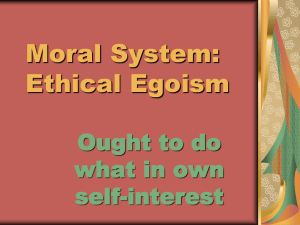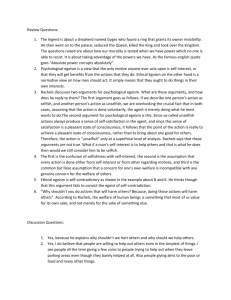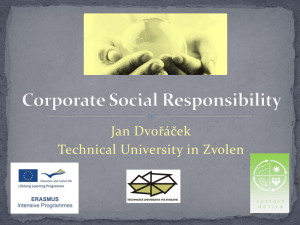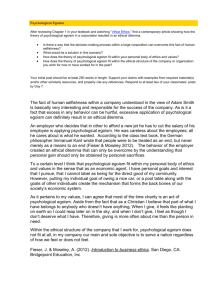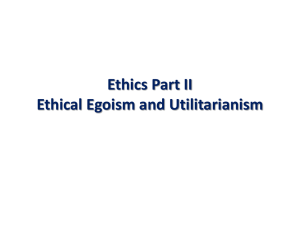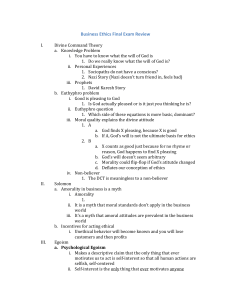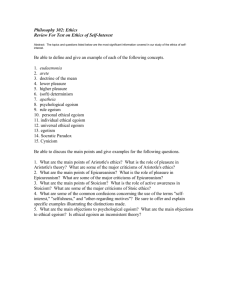Ethics: Discovering Right and Wrong
advertisement
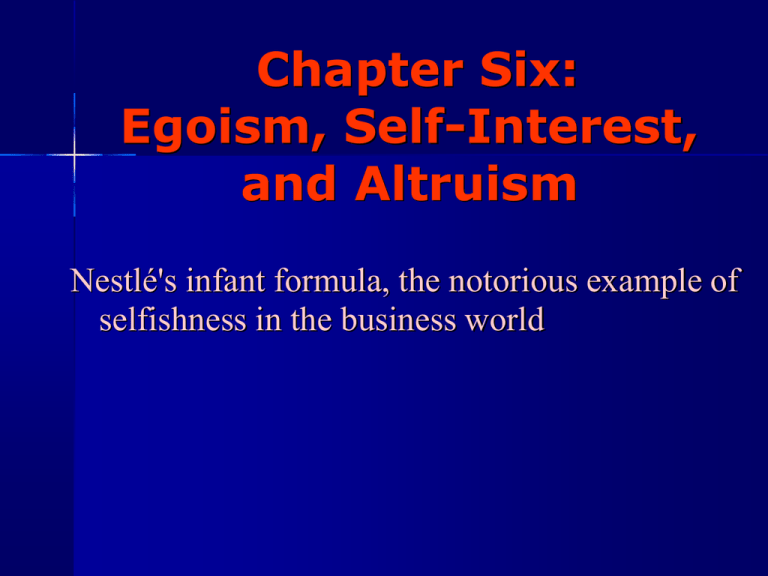
Chapter Six: Egoism, Self-Interest, and Altruism Nestlé's infant formula, the notorious example of selfishness in the business world Two Main Types of Egoism Psychological Egoism: We always do that act that we perceive to be in our own best self-interest. Ethical Egoism: Everyone ought always to do those acts that will serve his or her own best self-interest. The Argument from Self-Satisfaction S. Everyone is an egoist because everyone always tries to do what will bring him or her satisfaction S1. For any act A, everyone does A in order to obtain satisfaction The Argument from Self-Satisfaction S2. We all do the act that we most want to do, and as a consequence, we are satisfied by the success of carrying out the act. S3. We always try to do what we most want to do and, as a consequence of success in carrying out the act, experience satisfaction. The Paradox of Hedonism The best way to get happiness is to forget about it. Worthy goals will indirectly bring about happiness. Focus on the goals, not the happiness. Seems to suggest psychological egoism has severe problems The Argument from SelfDeception Alter interpretation of S to include subconscious motivations. Thesis now states that sometimes we are self-deceived about our motivation, but whenever we overcome self-deception and really look deep into our motivational schemes, we find an essential selfishness. Ethical Egoism Everyone ought to always do those acts that will best serve his or her own best selfinterest. Morally right actions are those that maximize the best interest of oneself. Does not maintain that every person ought to serve the best interests of me specifically. The Argument from Strict Psychological Egoism 1. We all always seek to maximize our own self-interest. 2. If one cannot do an act, one has no obligation to do that act. 3. Altruistic acts involve putting other people's interests ahead of our own. The Argument from Strict Psychological Egoism 4. But, altruism contradicts psychological egoism and so is impossible 5. Therefore, altruistic acts are never morally obligatory. Hobbes's Argument from Predominant Psychological Egoism Selfishness forces us into chaos, and selfishness forces us to solve the problem through mutually agreed-on moral codes. Problem: assumes we cannot do any better than be egoists, so we should be as strategic about our egoism as possible. Smith's Economic Argument Individual self-interest in a competitive marketplace produces a state of optimal goodness for society at large The result of an “invisible hand” A two-tier system –Tier 2 General goal: social utility –Tier 1 Individual motivation: egoistic Rand's Argument for the Virtue of Selfishness Selfishness is a virtue Altruism a vice, a totally destructive idea that leads to the undermining of individual worth Every individual has a duty to seek his or her own good first, regardless of how it affects others Arguments Against Ethical Egoism 1.The Inconsistent Outcomes Argument: Ethical Egoism cannot be true because it fails to meet a necessary condition of morality – being a guide to action Arguments Against Ethical Egoism 1.The Publicity Argument: An egoist cannot publicly advertise his egoistic project without harming that very project. Arguments Against Ethical Egoism 1.The Paradox of Ethical Egoism: To reach the goal of egoism one must give up egoism and become (to some extent) an altruist, the very antithesis of egoism. Arguments Against Ethical Egoism 1.The Argument from Counterintuitive Consequences: It is an absolute moral system that not only permits egoistic behavior, but also demands it. Arguments Against Ethical Egoism The Problem of Future Generations: Egoism seems unable to deal with the problem of obligations to posterity. The egoist gains nothing by preserving natural resources for future generations that do not yet exist and thus can give no benefit to the egoist. 5. Evolution and Altruism Sociobiology theorizes that social structures and behavioral patterns, including morality, have a biological base, explained by evolutionary theory. There is a difference between pure altruism and reciprocal altruism but we have a duty to both kinds of altruism.
